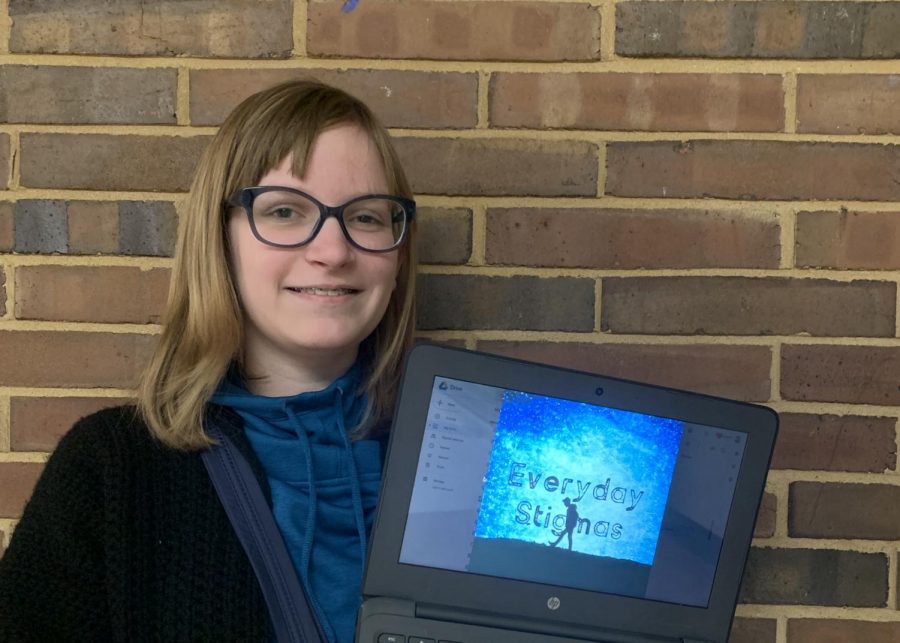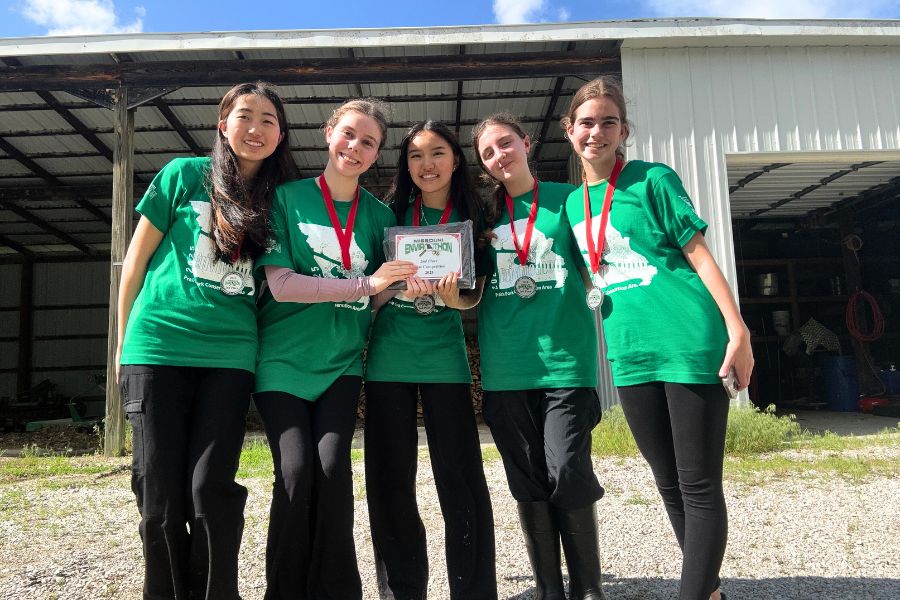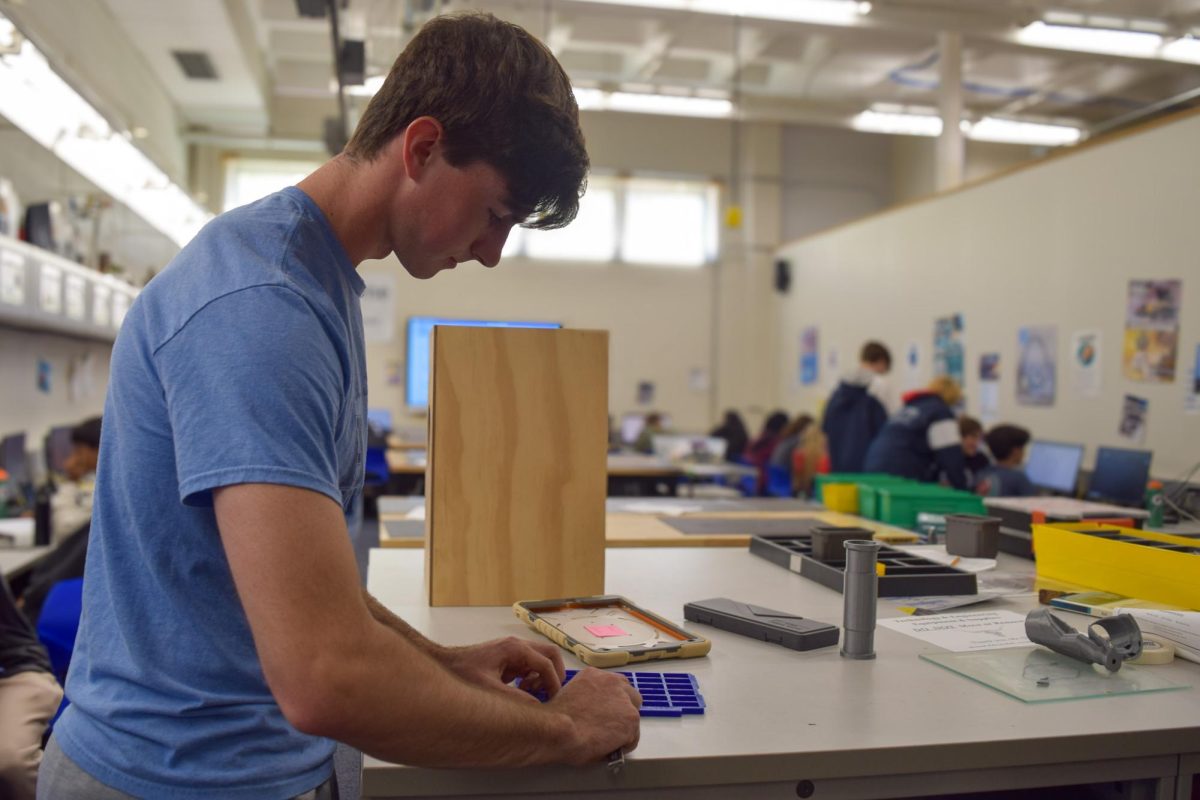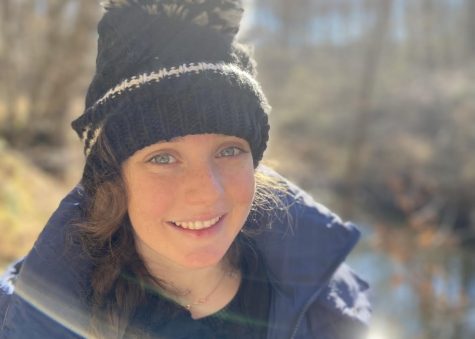Students whisper among themselves and excitement increases with the thought of the unknown as English teacher Kim Hanan-West introduces a podcast assignment to her 2018-2019 Honors English I class.
Sophomore Amanda Clark, a student of Hanan-West last year, created her podcast, Everyday Stigmas, to bring to light the stigma surrounding mental health, and is now continuing to create episodes outside of the classroom.
“I knew that I really enjoyed making the first episode and I wanted to have a project for myself to work on outside of school, something that was entirely for me,” Clark said.
This was the first time Hanan-West decided to include podcast production as a form of writing and self-expression. Students connected the topic of their podcasts to the conflicts presented in the Greek tragedy “Antigone” to current world issues.
“I decided to do a podcast with ‘Antigone’ because there were so many current conflicts relevant to students now,” Hanan-West said.
Clark decided to focus her podcast on the stigma surrounding mental health after watching a TED Talk by Mark Henick. In the video, Henick recounts his experience with depression as a teenager and discusses the importance of fighting the mental health stigma.
“I was very, very moved by [the video], so I wanted to make the podcast primarily about [Henick] and what he talks about,” Clark said. “He made me see mental health differently, and he made me realize how you could share your story. I realized that one of the biggest problems is the stigma around [mental health]. We don’t always talk about mental health openly, but I also recognize that mental health [is] not something crazy or distant, it’s something that people deal with every day.”
Sophomore Salam Hadji, also a member of Hanan-West’s class last year, feels that Clark’s podcast helped her to see mental health in a new way.
“I used to be very self-conscious [talking about mental health] because I was struggling myself, but now I see other people talk about it and I can express myself in that more,” Hadji said.
Clark feels that the podcast is more of a hobby than an assignment, but it is a hobby with a distinct goal.
“Part of [my goal] is just for me to feel like I’m creating something that I care about,” Clark said. “If other people see [the podcast], then the purpose for them is to be more aware of what people are dealing with all around them.”
Hanan-West found Clark’s podcast professional, engaging and enlightening.
“I remember a student who was kind of chuckling at the idea of presenting their podcast after her because [Clark’s] sounded so incredibly polished and produced,” Hanan-West said.
The continuation of Clark’s podcast has shaped Hanan-West’s outlook on podcast production in the classroom.
“To know that a new mode, broadcast, if you will, or the research that came with a podcast, has sort of impacted students so positively makes me feel relieved,” Hanan-West said. “Now I’m starting to understand the greater value in this type of writing, in this type of production, and I’m able to teach it better knowing that a student has accepted this as part of a hobby or passion that they have.”
Clark hopes to post a new episode annually. Her next episode will be about eating disorders and the stigma around them as well as what people can do to combat it. Her target audience is everyday people who she can inform and educate and she wants the podcast to be a gateway for people to become more interested in researching and looking into everyday stigmas.
“There are a lot of stigmas in general, honestly, but eating disorders and mental health are the two themes I am talking about,” Clark said. “They’re very important in today’s world, not only because of how prevalent they are, but because [mental illnesses and eating disorders] are seriously detrimental to people’s health. It can be dangerous when we continue to spread these stigmas and prevent people from getting help. I want people to become more aware of certain issues and things that are going on around them. I want them to be proactive in taking further steps to change the way they act.”
For Hanan-West, the fact that Clark has decided to build off of the original podcast assignment is in itself exciting.
“It excites me that I was able to bring [the podcast] to her and kind of provide a little spark,” Hanan-West said. “The other thing for [Clark] is this is a wide-open field. It’s totally open, so I’m excited for her in that respect.”
Clark has big plans for the future of the podcast, possibly extending to a future career relating to fighting the stigma.
“I’m not entirely sure if I want to go into advocacy, but I do want to open the conversation and talk about this with people around me,” Clark said. “Because you know you have all these advocates that influence thousands of lives, but it’s also important just to influence one.”
National Alliance on Mental Illness: 1-800-950-NAMI: 1-800-950-6264
Missouri Crisis Hotline: 888-761-4357



![Focused on providing exceptional service, sophomore Darsh Mahapatra carefully cleans the door of a customer’s car. Mahapatra has always believed his customers deserve nothing less than the best. “[If] they’re trusting us with their car and our service, then I am convinced that they deserve our 100 percent effort and beyond,” Mahapatra said.](https://pwestpathfinder.com/wp-content/uploads/2025/10/DSC_0018-1200x800.jpg)
![Sophomore Aleix Pi de Cabanyes Navarro (left) finishes up a soccer game while junior Ava Muench (right) warms up for cross country practice. The two came to Parkway West High School as exchange students for the 2025-2026 school year. “The goal for the [exchange] program is to provide opportunities for both Parkway students and our international exchange students to learn about other cultures, build connections and become confident, capable, curious and caring — Parkway’s Four C’s — in the process,” Exchange Program Lead Lauren Farrelly said.](https://pwestpathfinder.com/wp-content/uploads/2025/10/Feature-Photo-1200x800.png)

![Gazing across the stage, sophomore Alexis Monteleone performs in the school theater. The Monteleone family’s band “Monte and the Machine” has been releasing music since 2012, but Alexis started her own solo career in 2024 with the release of her first single, Crying Skies. “My whole family is very musical, [and I especially] love writing [songs with them],” Monteleone said.](https://pwestpathfinder.com/wp-content/uploads/2025/09/DSC7463-1200x798.jpg)
![Amid teaching a lesson to her AP Calculus BC class, Kristin Judd jokes alongside her students in their funny remarks. Judd has always enjoyed keeping the mood light in her classroom, along with on the volleyball court. “[I enjoy] that side talk where you see [or] overhear a conversation and chime in, or somebody says something funny,” Judd said.](https://pwestpathfinder.com/wp-content/uploads/2025/09/image-1200x730.jpg)
![Eyeing the ball, junior Ella McNeal poses for her commitment pictures at Clemson University. McNeal’s commitment comes after months of contact with top Division 1 soccer programs. “ It has taken a lot to get to where I am, but I know that [what] I've already been through is just the beginning, and I can't wait for what is to come,” McNeal said.](https://pwestpathfinder.com/wp-content/uploads/2025/09/IMG_4926-1200x900.jpeg)


![Senior Adam Zerega stands with senior Dexter Brooks by farm equipment. Zerega often worked with friends and family on his farm. “I've been able to go to my family's farm since I was born. I [spend] at least three weekends a month [on the farm], so I'm there all the time,” Zerega said.](https://pwestpathfinder.com/wp-content/uploads/2025/04/IMG_4872-1200x900.jpg)

